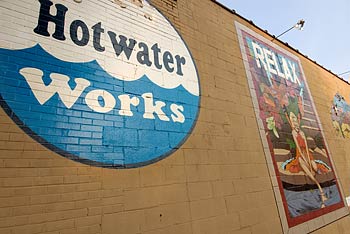Japanese soaking tubs have been around for decades — just not here in Lansing. James McFarland, of Michigan Avenue’s
Hotwater Works, expects to change that picture.
A year and a half ago, he invested $75,000 in the design and China-based manufacture of the Japanese-style tubs he calls
WonderTubs. Already, he has covered the development costs and sold two containers of56 tubs. At $3,000 each, that’s $168,000, or $93,000 profit.
At 61 years old, McFarland owns his own building, is debt

free, and has found a product he’s sure will make or keep anyone well who uses it.
McFarland is the Henry Ford of hot tubs, practicing the
Blue Ocean Strategy dubbed by W. Chan Kim and Renee Mauborgne in their book of the same name.
McFarland is selling products of his own making, not someone else’s.
Japanese tubs have very hot water that does not move, as opposed to hot tubs and spas, he explains. The 118 degree water stimulates 2.3 million sweat glands.
“The glands pull body water—a mixture of salt, mineral and water—out of the body, and with it comes toxic waste material from unnatural additives in food, poisons from water and air, and God knows what else,” he says.
Beside its health aspects, the tub is environmentally sensible. Left plugged in 24 hours a day, it uses about 75 cents in energy per month, McFarland says.
Because of the water’s heat, no chemicals are needed. An ozone process purifies it further to near drinking-water purity. No special plumbing is required.
McFarland uses his own tub daily. For all its success, he continues to tinker with the WonderTub’s design, working now on a solar energy model.
Source: James McFarland, WonderTub
Gretchen Cochran, Innovation & Jobs editor, may be reached
here.
All Photographs © Dave Trumpie
Enjoy this story?
Sign up for free solutions-based reporting in your inbox each week.